What do you do when you have to choose between your dream and your family? What if you don’t want either? In the 1960 film Tirez Sur le Pianist, or Shoot The Piano Player in English, directed by François Truffaut, Charlie Kohler (Charles Aznavour) has a beautiful talent for playing the piano. Still, his two brothers keep accidentally roping him into the gangster lifestyle he tried so hard to leave behind. We will cover two Truffaut films in this issue, both presenting mindful ideas about love and family. In this film, he also explores how the smallest choices in life can lead to a different outcome.
Shoot the Piano Player was an adaption from the 1956 novel written by David Goodis, called Down There, but in France, the title was Tirez Sur le Pianist. The storyline remained similar, but the character Charlie is portrayed differently in the film. In the novel, Charlie is a confident, self-willed individual, but Truffaut turns Charlie into a timid, standoffish man who doesn’t know how to get what he wants. There is a part in the film where he is visibly timid that he must buy books on how to not be so shy. I think Charlie’s change of character is fitting because his uncertainty in the film makes the narrative more morbid and creates an exciting dynamic within himself that wouldn’t be there if he were confident about everything. Truffaut said the inspiration to make the film was based on one photo found in the novel – an image of a car driving through the snow. He combines a fairytale with a thriller by creating a love story and a secondary narrative embedded in the film, which focuses on the gangster side of Charlie’s life.
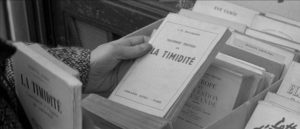
Charlie shopping for books on how to become less timid.
At the beginning of this black and white film, we don’t start with Charlie but rather his brother, Chico (Albert Remy), who has come to Charlie in need of help running away from a few men he got into trouble with. Charlie declines to help him as he goes to play the piano in a small, jazzy dive bar. His brother says, “What the hell are you doing here? You’re throwing your life away,” but all Charlie can respond is, “It’s alright” (Shoot the Piano Player). The dialogue sets the tone for the rest of the film and who he is as a person. One thing that I enjoyed about this specific Truffaut film is that he makes use of inner dialogue from Charlie. We hear his thoughts as he goes throughout his day. Most times, his thoughts don’t agree with his actions, and due to that, it causes some significant downfalls in his life. We hear Charlie’s thoughts in first person, but the camera is positioned in a 3rd person point of view; there are no first-person point of view shots. Adding the extra perspective, we feel like we are watching like a “fly on the wall” but still gaining insight from the main character. This is a brilliant way to portray Charlie’s personality and simultaneously puts the audience in his shoes. Truffaut also utilizes flashbacks to catch us up on why Charlie is “throwing his life away” (Shoot the Piano Player).
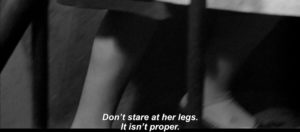
A 3rd person POV of Charlie’s thoughts.
A waitress named Lena (Marie Dubois), had known of Charlie when he was a famous pianist, and before he changed his name from Edouard to Charlie. When Charlie started playing the piano at the bar she worked at, she was instantly in love. Her feelings of fondness towards him turn out to be mutual. During Charlie’s flashback, we find out his real name is Edouard. The flashback tells us about the collapse of his legacy as a famous pianist. It’s also a sorrowful love story. We meet the first love of his life, Thérèse Saroyan (Nicole Berger). As time passes, their relationship grows, but they hit a rough patch as most relationships do. They seem to work it out, but Charlie can still sense something is wrong. He talks with his producer, and he suggests Charlie invites Thérèse to his cocktail party. He finds her hiding away in their apartment the night of the party. She tells him that she had to sleep with Charlie’s producer to get the contract he needed to become famous. Her monologue is touching, more profound than just a confession. The camera follows her in one long shot to not disturb her speech. Charlie’s inner dialogue tells him to stay and comfort her. Unfortunately, he hastily runs out of the room but immediately regrets his decision. Even though he only took a few short steps away from the room, by the time he runs back, Thérèse has jumped out of the window, and her lifeless body lays face down on the street.
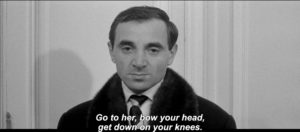
Charlie thinking about what to do after hearing about his wife cheating.

Thérèse on the street after jumping out of the window.
After that, Edouard became Charlie and lived a simpler life of being a recluse. When you think the narrative can’t get any more dramatic, the thugs trying to track down Chico kidnap their younger brother, Fido (Richard Kanayan). Charlie and Lena try to track them down to no avail, but, Fido escapes on his own and runs to his brothers. All three older brothers get into a gun shoot out at their parents’ cabin, and Charlie loses the love of his life again, due to his negligence and fear. The film ends with Charlie back at the piano at the same bar that he started at, looking out into the distance. It’s not a happy ending –as sad endings seem to be a pattern in Truffaut films– but the conclusion makes us think about our own lives. The bigger questions are, are you doing what makes you happy? Are you doing everything for yourself?
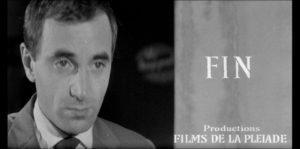
The ending of Charlie staring out into the distance.
While there are some funny lines and scenes in the film, you wouldn’t quite watch the movie casually with friends, unless your friends like dismal films. The theme alludes to the darker side of life and how sometimes not everything will work out in your favor. The film’s theme shows that its what you do with your life choices; that is what truly matters. I have never read the novel before, but the message is most likely the same – don’t be hesitant, don’t be afraid, and take a chance. Knowing what Charlie was thinking about, we know he could have changed his path by doing what he was actually thinking, but his life turned out pretty miserable since he didn’t.
Francois Truffaut once again dazzles me with his existential questions depicted gracefully through the lives of characters he gave new meaning to.

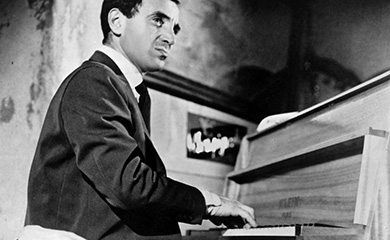
Recent Comments